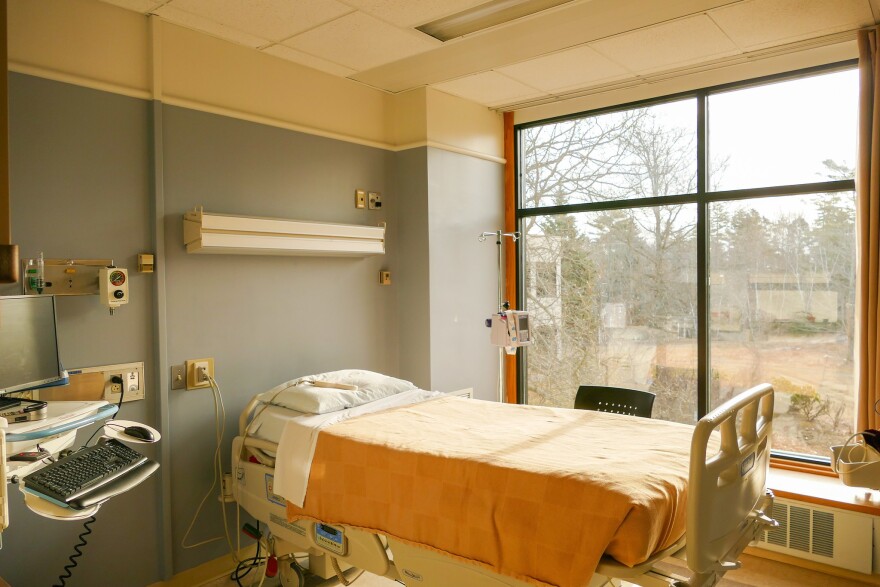State officials have been reminding Mainers that the worst of the coronavirus outbreak is still to come.
The Director of the state Center for Disease Control says the number of confirmed cases of COVID-19 – now at 155 - is just the tip of the iceberg. As hospitals across the state prepare for a potential influx of patients, those in rural areas face unique challenges - but in some cases, are well-suited to step up in response to a surge.
As of Thursday, there were still no confirmed cases of COVID-19 in Aroostook County. But at Northern Maine Medical Center in Fort Kent, Chief Operating Officer Alain Bois says the hospital is already feeling the effects of the pandemic.

"This is having a stunning financial impact for hospitals and even more for rural hospitals."
Bois says Northern Maine Medical Center hasn't suspended elective procedures and other services yet, as other hospitals have in order to free up resources for the coronavirus. But in an effort to practice social distancing, patients are cancelling appointments anyway.
"And for good reasons. But this is also having a direct financial impact on hospitals, with the fact that we have to ramp up our supplies and our masks and our gowns, and medication supplies in preparation for an influx of patients. And price gouging is real."
With supplies of personal protective equipment low nationwide, Bois says some suppliers are charging several times the typical price for items such as N95 masks.
The anemic supply of protective equipment is a top issue for Houlton Regional Hospital. Director of operations Shawn Anderson says they've had to get creative.
"An auto supply store that can provide us with a face shield that we can purchase that will offer up that protection."
In other cases, creative alternatives come from within the hospital.

"I'm Deb Ellis, and what I'm doing is putting cuffs on the sleeves."
Ellis works in medical records at Houlton Regional Hospital. She and three other staff members set up sewing machines and an assembly line in a hospital conference room earlier this week to stitch gowns.
"We took crew socks, cut the top of them off, and I'm stitching them on to the sleeve, and then someone takes the sleeve and stitches it to the gown," Ellis says.
The director of HR at Houlton Regional Hospital, Lisa Perfitt, recorded and sent Maine Public some audio of her colleagues stitching the impervious gowns. She says the project started after the director of nursing brought her a sample gown and told her the supply was running low, "and said can you make a pattern, can you get some washable gowns made? So we brought the sample up, tore it apart, came up with a pattern. And then we sent some folks to Mardens, and got some fabric. And as of today, we will have made 40 reusable gowns."
As some hospitals ramp up homemade supplies, others are ramping up capacity. At Franklin Memorial Hospital in Farmington, president Trampas Hutches says they are converting a conference room into a 30-bed unit to absorb non-COVID 19 patients if other beds need to be used for treatment of the coronavirus.
"We have that almost all the way set up in case we have a surge of patients. So we almost doubled our capacity."
Several rural hospitals are well-suited to help absorb a surge of patients, says Dr. Mark Fourre. He's the president of Waldo County General Hospital in Belfast and Pen Bay Medical Center in Rockport.
"So hospitals like Pen Bay, which were built to be a 100-bed hospital, our census is, you know, high 50s, low 60s. So we are now developing additional space for patients in areas that we maybe converted into offices or other things."

But one complicating factor is whether rural hospitals will have enough staff to meet demand should those extra beds be filled. Dr. Sheena Whittaker, a senior physician leader at Northern Light Maine Coast Hospital in Ellsworth says just as the hospital is taking inventory of medications and equipment, it is also assessing staff. Some are newly available because the hospital has suspended elective surgeries and other services. But, "We are also looking at contingency plans, such as bringing nurses and doctors out of retirement that worked here maybe just as little as a year ago or so, and could they come in and help with the less acute patients."
At Rumford and Bridgton Hospitals, both part of the Central Maine Healthcare System, president Peter Wright says there has been talk of dedicating one hospital exclusively to COVID-19 patients if necessary. And while he says the size of rural hospitals gives them the advantage of being nimble to respond in a situation like the coronavirus, they're also vulnerable.
"I stay up at night and I worry about my peers and ourselves and our ability to withstand a long duration of this."

That's because small critical access hospitals typically skate on break-even financial margins or worse, and many have suspended typical services. Wright says for the sake of both the hospitals and the community, he hopes people take coronavirus precautions seriously.
"How big this becomes is completely reliant on us. We will decide as a community how big this gets. And that is absolutely connected to, does the community heed the warnings."
Those warnings: to wash hands, strictly adhere to social distancing, and stay home.
Originally published March 26, 2020 at 5:57 p.m. ET.




